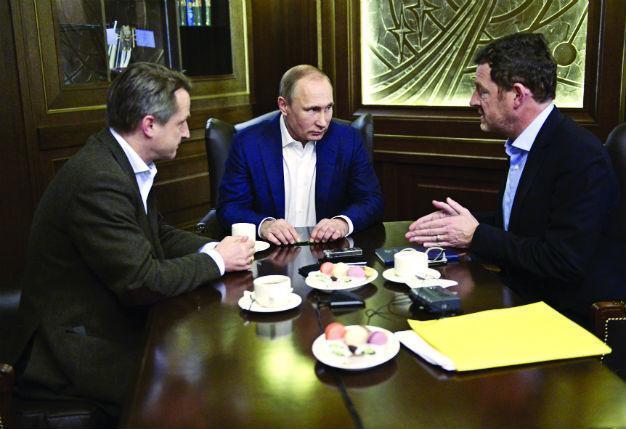Putin hints at granting asylum to Syria’s Assad
MOSCOW

REUTERS photo
Russian President Vladimir Putin has hinted that his country could grant asylum to Syrian President Bashar al-Assad but noted that elections must first take place in Syria so that the country’s people can choose their own future.
Commenting on possible asylum to be granted to al-Assad if he were to lose elections, Putin said it was premature to say whether Moscow would grant asylum to al-Assad, who had made “many mistakes,” in the course of the Syrian conflict.
“You know I believe that it is premature to discuss this,” Putin was quoted as saying in the second part of an interview with German daily Bild published on Jan. 12.
“We gave asylum to Mr. Snowden; it was more difficult than giving it to al-Assad,” he said, referring to fugitive U.S. intelligence leaker Edward Snowden, who was granted asylum in Russia in 2013.
“First one needs to give the Syrian people an opportunity to have their say,” Putin said. “And I assure you that if this is done in a democratic way, then maybe he won’t have to go anywhere. And it does not matter whether he is president or not.”
Global powers are seeking to push the Syrian regime and the opposition to the negotiating table in a bid to end the five-year war that has killed 260,000 people.
A new constitution for Syria
Putin also said Syria needed to start working on a new constitution as the first step to finding a political solution to its civil war, though he acknowledged the process was likely to be difficult.
Putin, who has thrown Russia’s support behind al-Assad with air strikes, said the crisis in relations between regional rivals Saudi Arabia and Iran would complicate the search for peace in Syria.
“I believe it’s necessary to move toward constitutional reform [in Syria]. It’s a complicated process, of course. And after that, on the basis of the new constitution, [Syria should] hold early presidential and parliamentary elections,” Putin said.
Putin, obliquely referring to diplomatic pressure from the United States and France to concentrate Moscow’s firepower on the Islamic State of Iraq and the Levant (ISIL) militants, said Russian military aid was helping the Syrian opposition in the fight against ISIL as well as helping al-Assad.
“You are talking about al-Assad as our ally. Do you know that we are backing the actions of the armed opposition combating the Islamic State [ISIL]? ... We are coordinating our joint actions with them and support their offensive operations on different parts of the front with strikes by our air force,” he said. “I am talking about hundreds, thousands of armed people, who combat the Islamic State … Some of them have already spoken about it in public, others prefer keeping silent but the work is going on.”
‘Odd’ for Turkey to apply to NATO after jet crisis
Putin said it was “odd” for Turkey to apply to NATO and use the alliance as a “shield,” instead of trying to explain the situation to Russian authorities, as no one had attacked Turkey.
“Instead of trying to provide us with an explanation for the war crime they committed, that is, for downing our fighter jet that was targeting terrorists, the Turkish government rushed to NATO headquarters seeking protection, which looks quite odd and, in my view, humiliating for Turkey,” Putin was quoted as saying in the second part of an interview with daily Bild.
“Turkey is a NATO member. However, the problems that have emerged have nothing to do with Turkey’s NATO membership; nobody attacked Turkey,” he added.
“If Turkey has vested interests elsewhere in the world, in the adjacent countries, does it mean that NATO must protect and secure these interests? Does it mean that Germany, as a NATO member, must help Turkey to expand into neighboring territories?” Putin asked.
